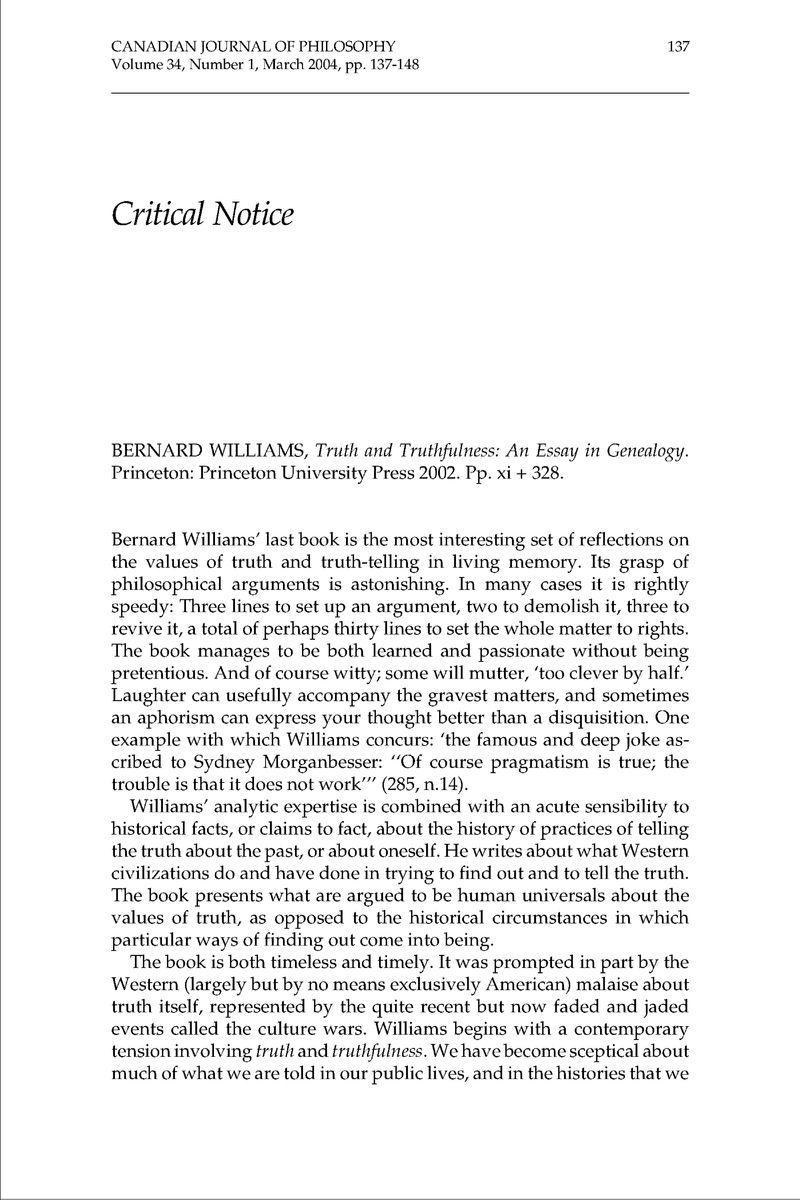Article contents
Bernard Williams Truth and Truthfulness: An Essay in Genealogy. Princeton: Princeton University Press 2002. Pp. xi + 328.
Review products
Published online by Cambridge University Press: 01 January 2020
Abstract

- Type
- Critical Notice
- Information
- Copyright
- Copyright © The Authors 2004
References
1 Because some of my own work leans heavily on that of Michel Foucault, some readers may wish me to comment on this footnote:
Paul Veyne writes, “We agree with Michel Foucault: the history of ideas properly Starts when one historicizes the philosophical idea of truth.” A great deal turns here on the force of “philosophical”. In fact, much of Foucaulf s work addresses epistemological issues, or what at different times counts as establishing truth in different fields (300, n.31).
I agree with Williams’ gloss. However, if one historicizes the idea of truthfulness, as Williams does, but does not make exactly his sharp cut between truth and truthfulness, one may end by being quite comfortable with Paul Veyne's Statement.
2 Hence his objection to Veyne's observation just quoted.
3 Try other values for X in A shift in conceptions ofwhat it is to teil the truth about X. Say X = spatial relations (geometry) with the legendary Thaies replacing the historical Thucydides. The new method of f inding out and telling the truth is proof. One can continue this line of analysis with the emergence of many methods of argumentation in the sciences. Common sense rejects the fact that they are historically emergent and bring into being whole new modes of truth-telling. Denial concludes that the sciences are all relative. Both are wrong. One may substitute e.g. ‘geometry’ for what Williams says about ‘historical time’ namely: ‘The invention of historical time [geometry and demonstration] was an intellectual advance, but not every intellectual advance consists of refuting error or uncovering confusion. Like many other inventions, it enabled people to do things they could not conceive of doing before it happened’ (171).
4 Cambridge, MA: Harvard University Press 1972
5 One part of my essay Truthfulness’ (to appear in Common Knowledge) elaborates on the literary dimensions of the Rousseau-Diderot couple.
6 J.L. Austin, ‘Truth’ an Aristotelian Society Symposium of 1950, reprinted in Austin, J.L. Philosophical Papers (Oxford: Clarendon Press 1961), 85Google Scholar
7 Aristotle, Metaphysics T, 1011b25. In the translation by Christopher Kirwan, Oxford: Clarendon Aristotle Series, 23: ‘To say that that which is is and that which is not is not, is true’ In the translation by W.D. Ross: ‘To say of what is that it is, and of what is not, that it is not, is true.’
8 Madeleine S. and J. Lane Miller, Harper's Bible Dictionary (New York: Harper and Brothers 1952), 786. Be on guard that this is a distinctly Protestant work, but it does have the protestant virtue of being down to earth.
9 That is the Version, Authorized (King James). In the Jerusalem Bible (London: Darton, Longman and Todd 1966)Google Scholar we read ‘Love and truth.’
10 The Jerusalem Bible here replaces truth by the idea of reliability: ‘You yourself will remain unscathed with his faithfulness for shield and buckler.’
- 5
- Cited by


